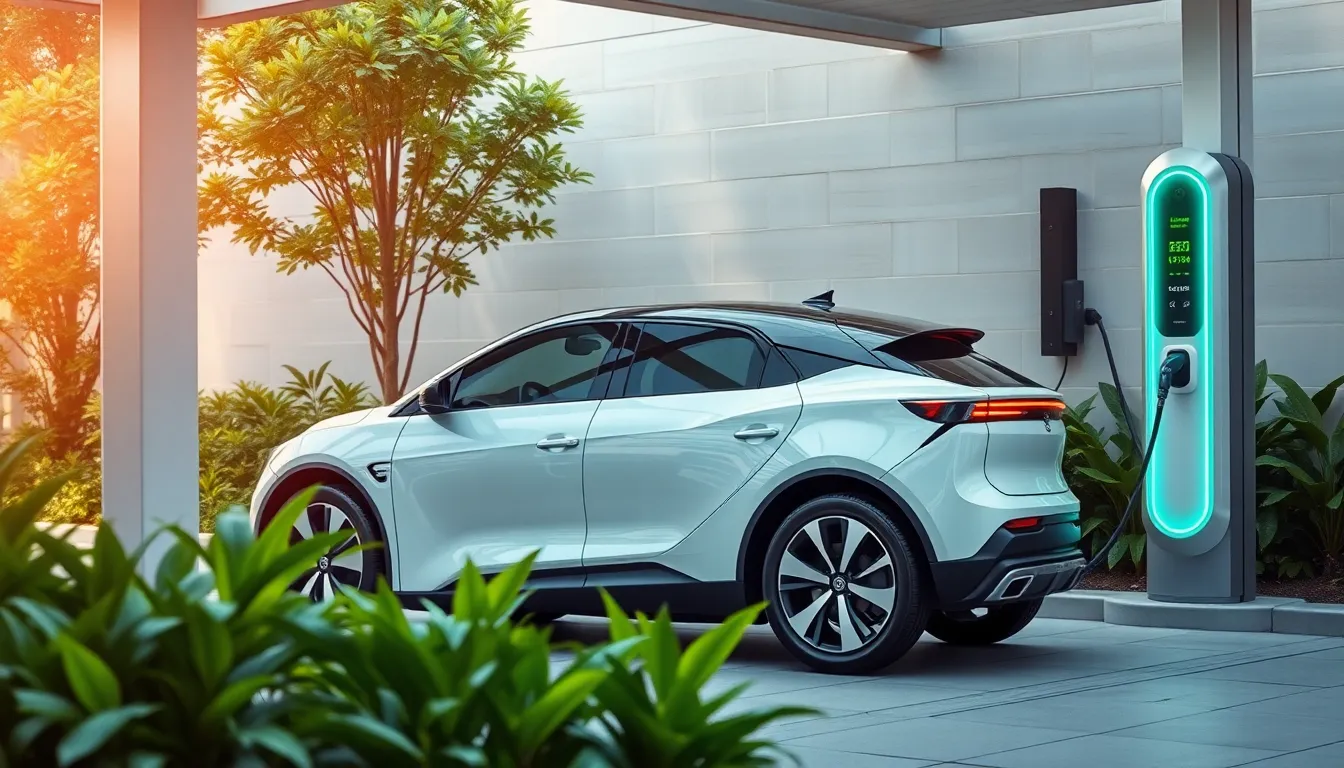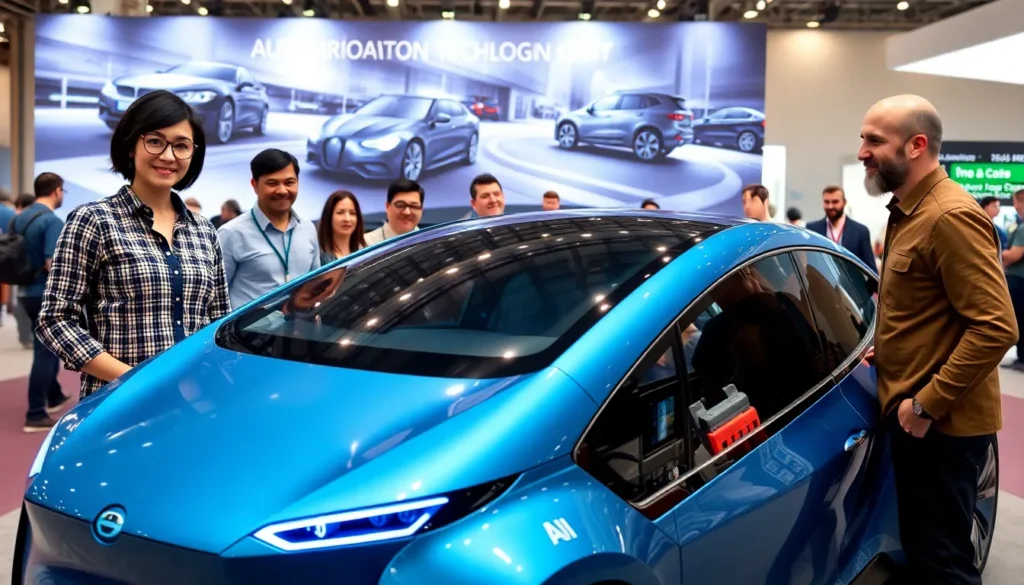The world of auto tech is zooming ahead faster than a kid on a sugar rush. With innovations popping up like popcorn, it’s hard to keep track of what’s new and what’s just a fancy dashboard ornament. From self-driving cars that could make your grandma’s driving look like a stroll in the park to electric vehicles that whisper sweet nothings about saving the planet, the future of transportation is nothing short of thrilling.
Table of Contents
ToggleOverview of Auto Tech Innovations
Auto tech innovations focus on enhancing vehicle performance and user experience. Major advancements include electric vehicles (EVs) that reduce reliance on fossil fuels and improve environmental conditions. Companies are introducing self-driving capabilities, aiming to increase safety and reduce traffic accidents.
Artificial intelligence (AI) plays a crucial role in these developments. AI algorithms analyze data to optimize driving patterns and adapt to road conditions. Additionally, connected vehicles improve communication with other cars and infrastructure, creating a more efficient transportation network.
Battery technology has seen significant improvements, enabling longer driving ranges and faster charging times. Solid-state batteries now offer higher energy density and safety compared to traditional lithium-ion batteries. This progress supports the growing adoption of EVs and creates more accessible charging options for consumers.
The use of augmented reality (AR) enhances driver awareness. AR systems project information, such as navigation prompts, onto the windshield, enabling drivers to maintain focus on the road. Such features empower drivers with critical information while minimizing distractions.
Moreover, sustainable materials are gaining traction in automotive design. Manufacturers are exploring recycled or bio-based materials to create a lighter and more eco-friendly vehicle construction. This shift aligns with global initiatives to promote sustainability in transportation.
Innovative entertainment options also enhance the driving experience. In-car connectivity allows for seamless integration of smartphones and other devices. Drivers access navigation, music, and communications effortlessly, making journeys more enjoyable.
These advancements demonstrate the automotive sector’s commitment to innovation, safety, and environmental consciousness. The future of transportation continues to evolve, with technology leading the way to a more sustainable and efficient landscape.
Major Trends Shaping the Industry

The automotive industry experiences significant transformation through innovations. These advancements are crucial for enhancing performance and addressing environmental challenges.
Electric Vehicles and Their Impact
Electric vehicles (EVs) lead the charge in reducing greenhouse gas emissions. By minimizing reliance on fossil fuels, EVs contribute significantly to environmental sustainability. The growth of the EV market reflects consumer demand for cleaner transportation options. Companies report that advancements in battery technology, particularly solid-state batteries, provide longer driving ranges and shorter charging times, enhancing user convenience. With infrastructure development, such as more charging stations, EV adoption is set to soar. Combined with government incentives, the transition to electric driving aligns with global sustainability goals.
Autonomous Driving Technology
Autonomous driving technology focuses on enhancing safety and efficiency. Manufacturers use advanced sensors and artificial intelligence to create systems capable of navigating roads with minimal human intervention. This development significantly lowers the risk of accidents, aiming to reduce traffic-related fatalities. Many vehicles now feature adaptive cruise control and lane-keeping assistance, paving the way for fully autonomous options. Testing continues to refine these systems, with real-world data helping to optimize performance. Industry leaders emphasize the importance of connectivity, allowing vehicles to communicate with traffic signals and other cars for improved traffic flow.
Key Players in Auto Tech
Key players in the auto tech industry include traditional automakers and innovative tech companies. These entities drive advancements in vehicle technology and impact market trends.
Traditional Automakers
Leading manufacturers such as Ford, General Motors, and Toyota focus on electric vehicles and autonomous driving technologies. Innovation labs develop state-of-the-art features that enhance safety and driving experience. Companies invest significantly in battery technology, improving energy density and reducing charging times. Successful collaboration with tech firms bolsters efforts in artificial intelligence and connectivity. Market leadership hinges on adapting to consumer demand for sustainable practices and efficient vehicles.
Tech Companies Entering the Market
Companies like Tesla and Waymo redefine transportation with cutting-edge solutions. Tesla’s approach combines electric vehicles with sophisticated software for autonomous driving. Waymo pioneers self-driving infrastructures, making strides toward full autonomy. Additionally, tech giants like Google and Apple explore vehicle connectivity through advanced apps and services. Partnerships with traditional automakers create synergies that accelerate innovation in auto tech. Enhanced user interfaces and data integration streamline navigation and enhance safety features, capturing consumer interest and expanding market reach.
Future of Auto Tech Innovations
Anticipation surrounds upcoming auto tech developments, especially in electric vehicles (EVs). Expectations for reducing greenhouse gas emissions grow as more consumers shift towards sustainable transportation. Innovations in battery technology transform how vehicles operate, with solid-state batteries significantly improving driving ranges and reducing charging times.
Self-driving capabilities continue advancing, aiming to enhance road safety and efficiency. Features like adaptive cruise control and lane-keeping assistance pave the way for fully autonomous vehicles. Major automakers work on integrating artificial intelligence (AI) into their systems. AI helps optimize driving patterns and adjust to real-time road conditions, significantly improving safety and responsiveness.
Connected vehicles deepen communication with traffic infrastructure, resulting in smoother traffic flow and better overall efficiency. By leveraging data, these vehicles inform drivers of potential hazards and optimize routes for shorter travel times.
Sustainable materials for vehicle construction attract attention, as manufacturers increasingly prioritize eco-friendly solutions. Companies explore innovative materials that reduce environmental footprints while maintaining vehicle performance.
In-car connectivity leads to improved user experiences, allowing seamless integration with smartphones and other devices. Notable tech firms push boundaries by redefining transportation services through applications. Their contributions influence the growing market for electric and autonomous vehicles.
Each major player in the industry actively invests in battery development and collaborates with tech companies to enhance connectivity features. Traditional automakers remain focused on EVs to adapt to the evolving consumer landscape. Companies like Tesla and Waymo challenge the status quo and innovate, shaping the future of transportation with their cutting-edge solutions.
The landscape of automotive technology is evolving at an unprecedented pace. Innovations in electric vehicles and autonomous driving are not just trends; they’re reshaping how society views transportation. With advancements in battery technology and the integration of AI, vehicles are becoming smarter and more efficient.
As the industry embraces sustainability, manufacturers are prioritizing eco-friendly materials and practices. The future holds immense potential for connected vehicles that enhance safety and user experience.
As these technologies continue to develop, they promise to create a safer and more sustainable transportation ecosystem. The journey toward a smarter automotive world is just beginning, and it’s one that will undoubtedly enhance the way people travel for years to come.






